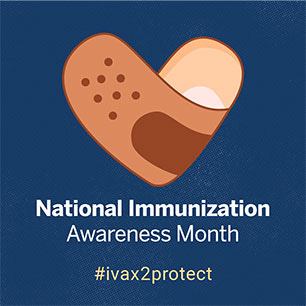Your Immune System
If you understand how your immune system works, you can understand and appreciate vaccines
Each August we celebrate National Immunization Awareness Month. Throughout the month those of us in the medical and public health communities highlight the importance of vaccinations for all people of all ages.
Vaccines save lives.
In celebration of National Immunization Awareness Month — I am putting together a series of posts for the month of August focused on the history of vaccines, how the immune system works (see below), the anatomy of a clinical trial (to test new vaccines), herd immunity, and three of my favorite vaccine-preventable disease.
The goal of this series (which will include new posts each Wednesday) is to educate you about the immune system & immunity, how vaccines are developed, and the diseases that vaccines prevent. And with the knowledge gained, I want to empower you to become fully vaccinated AND an advocate for vaccines in your community.
Here is part #2 in the series celebrating National Immunization Awareness Month — the HOW YOUR IMMUNE SYSTEM WORKS
(If you haven’t read part #1, check it out here)
“If you understand how your immune system works, you can understand and appreciate vaccines and how they can save your life or the lives of your children, and approach disease and sickness with a very different mindset and far less fear.”
~ Phillip Dettmer, in his amazing book Immune: A Journey into the Mysterious System that Keeps You Alive
The immune system is a complex and interconnected system of cells, organs, proteins, and chemicals. Your immune system’s goal is to keep you healthy. The immune system works as a home alarm system, a communications system, an aggressive military, and a data warehouse. It is capable of identifying pathogens (translation of the word pathogen is literally the maker of suffering and is defined as any microorganism that causes disease), destroying those pathogens, learning from being exposed to a pathogen, adapting to the changing environment inside your body, and responding to changes in the environment outside of your body. All the while, the immune system is remembering every single microorganism (virus, bacteria, or parasite) that it encounters during your lifetime.
The immune system is comprised of two systems (innate and adaptive). These systems work together to keep you healthy.
The innate immune system is comprised of the defenses you were born with. These defenses are generalists, only capable of distinguishing what is you (read: your cells) from what is not you (read: a pathogen). The innate immune system is a rapid response system. It identifies something in the body that is not you and communicates to all the other cells in your body that there is a pathogen. This is an early warning system. Interferons, which are proteins that are made to stop a pathogen from replicating in your body, work like an alarm system. They send signals throughout the body that the body has been invaded and defense forces need to respond. The innate immune system responds quickly and wholistically, meaning it will trigger a fever or inflammation throughout the body, to combat the pathogen/invader.
On the other hand, the adaptive immune system contains specialized super cells (as Dettmer describes them) that support the innate immune system. These super cells are defined by their specificity. They protect your body from specific pathogens through the production of antibodies (proteins that recognize specific antigens, which can be a virus, bacteria, parasite, or chemical that is not one of your own cells). The adaptive immune system must be trained and refined; it is NOT developed at birth like your innate immune system Your adaptive immune system develops as you are exposed to different pathogens.
B-lymphocytes (which we often call B-cells) along with T-lymphocytes (you guessed it, we call them T-cells) patrol your body looking for pathogens/invaders. Once a pathogen is identified, the B-lymphocytes create pathogen-specific antibodies that attach to the pathogen/invader. The T-lymphocyte is responsible for killing the invader and remembering. Your adaptive immune system is capable of remembering every pathogen you’ve been exposed to across your lifetime. It is equivalent to a sophisticated and ever-growing data warehouse.
This begs the question… if my immune system remembers every pathogen it has previously encountered, why (oh-why) do I get a cold every winter? why have I been diagnosed with COVID more than once? what about the endless times I’ve had influenza? or a stomach bug?
Unfortunately, our immune system is not perfect and it can be outsmarted by weasely pathogens, like viruses. A virus (just to be clear) is a packet of genetic code (DNA or RNA) that is surrounded by a protein cloak. Viruses cannot replicate alone. Instead, a virus must get inside of a host cell and quietly transfer its genetic information into the cell without being recognized by the immune system. Often, a virus ends up killing the host cell in the process, causing damage/illness in the host organism.
The superpowers of a virus are — its abilities to (1) replicate/multiple and (2) mutate/change quickly.
The SARS-CoV-2 virus has mutated in such a way (throwing new variants at us every couple of months) that it has become really good at causing damage to the interferons, which are part of our body’s early warning system.
So — why can you get COVID more than once? Because the virus has outsmarted our immune system. It can now sneak into our bodies and begin to replicate itself causing cell damage and cell death before the immune system can sound an alarm. It is as if the virus has become a highly trained covert operative (read: a super spy just like Sydney Bristow in my favorite TV show Alias) that can sneak into our bodies without anyone noticing.
It is not until there is so much virus in our body that other parts of our immune system take notice and begin to defend our bodies. And all those viral particles cause illness.
Despite SARS-CoV-2 bypassing/disabling our innate immune system’s alarm system, individuals who have received their COVID vaccinations will recognize the SARS-CoV-2 virus faster than individuals who are unvaccinated. This is because the adaptive immune system has been taught to recognize a COVID infection and respond appropriately with COVID-specific antibodies to fight infection.
Additional COVID vaccines (aka booster shots) are necessary and reinfections are likely because the virus has evolved into a super spy and is able to sneak past our innate immune system responses. The virus can enter our bodies without sounding the alarm. This buys the virus enough time to do damage to our bodies (read: make us sick) before other parts of the immune system recognize that a pathogen has penetrated the first lines of defense. But as soon as our vaccinated bodies realize that a pathogen is present, they begin to respond in full force using very specific antigens to defeat the SARS-CoV-2 virus.
Amazing, right?
The virus is super smart and has evolved to be super stealthy.
But we have defenses in place to ensure that the virus does not win the final battle. And vaccines provide our adaptive immune systems with appropriate memories of the SARS-CoV-2 virus so that when the virus is recognized by the body, our B- and T-cells can respond with force and in a timely manner.
The COVID vaccine is necessary because it provides the necessary training for the adaptive immune system to respond to a lot of the SARS-CoV-2 virus in the body. While the virus can get around several of the defenses of the innate immune system (by killing its communications system with its super spy skills), the adaptive immune system is ready to spring into action because it already has a memory of the virus and specific antibodies ready to defeat the virus. It doesn’t need time to identify the virus and mount a specific response. The vaccine decreases the amount of time the immune system needs to respond accordingly to the infection.
Our immune system is pretty amazing.
And our ability to train our adaptive immune system through the use of vaccinations is mindblowing and life-saving.
Without vaccines, our adaptive immune systems would not be primed to identify and fight the pathogens that cause disease.
Have more questions? Let me know.
Want to learn more?
I recommend the book Immune (quoted above). It is an informative book and oh-so easy-to-understand book. Plus, the graphics in it are beautiful. I also highly recommend the book On Immunity: An Inoculation by Eula Biss. It is one of the most beautifully written books I’ve read and it is very informative/thought-provoking. I’ll leave you my quotes from On Immunity—
“A vaccine introduces a small amount or a tempered version of the virus into the body - just enough to that the body is able to recognize it and deal with it when it encounters it again in the future… I think that people's resistance to vaccination isn't going to disappear until we address some of the nonmedical reasons for that resistance and people's discomfort and distrust of the government. That's bigger than what most medical professionals can handle.”
The science behind how our immune system works and how vaccines provide protection is sound. We need to address other nonmedical issues…
We will save that conversation for another day.
We end here with full knowledge that our immune can be trained through vaccinations to respond quickly and specifically to pathogens.
Vaccines are truly life savers.







